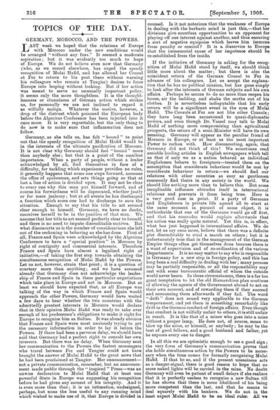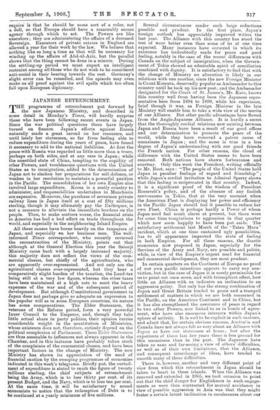TOPICS OF THE DAY.
GERMANY, MOROCCO, AND THE POWERS.
TAST week we hoped that the relations of Europe J with Morocco under the new conditions would be arranged " without any fuss." It seemed a moderate aspiration ; but it was evidently too much to hope of Europe. We do not believe even now that Germany (who, as we record elsewhere, has urged the speedy recognition of Mulai Hafid, and has allowed her Consul at Fez to return to his post there without warning his colleagues who remain at Tangier) desires to force Europe into leaping without looking. But if her action was meant to serve no unusually important policy, it seems only the more thoughtless. It is the thought- lessness or clumsiness of German action which strikes us, for personally we are not inclined to regard it as wilfully malign. Whatever the motive, however, a drop of the distrust which poisoned the European body before the Algeciras Conference has been injected into it once more. It is very regrettable, but the only thing to do now is to make sure that inflammation does not follow.
Germany, as she tells us, has felt " bound " to point out that the speedy recognition of Mulai Hafid would be in the interests of the ultimate pacification of Morocco. It is not clear why Germany should feel " bound " more than anybody else ; but that is a point of the smallest importance. When a party of people, without a leader acknowledged by all, find themselves in face of a difficulty, for tackling which experience provides no rules, it generally happens that some one steps forward, assumes the office of spokesman, and sets things going so that at last a line of action is decided upon. It may not be clear to every one why this man put himself forward, and of course his forwardness will be deprecated, whether justly or for mere jealousy ; but at all events he has discharged a function which some one bad to discharge to save the situation. Enough to say that his title to act seemed clear enough to himself. Germany, we have no doubt, conceives herself to be in the position of that man. We assume that her title to act seemed perfectly clear to herself, and there is no need to impute discreditable motives. But what disconcerts us is the number of considerations she left out of the reckoning in behaving as she has done. First of all, France and Spain were acknowledged by the Algeciras Conference to have a " special position " in Morocco by right of contiguity and commercial interests. Therefore France and Spain have almost a legalised right of initiative,—of taking the first step towards obtaining the simultaneous recognition of Mulai Hafid by the Powers. Let us not, however, strain that point ; it is a question of courtesy more than anything ; and we have assumed already that Germany does not acknowledge the leader- ship of France and Spain in these particular negotiations which take place in Europe and not in Morocco. But at least we should have expected that, as all Europe was talking of the way in which France and Spain would approach the other Powers, Germany would have waited a few days to hear whether the two countries with the admittedly greatest interests in Morocco would declare that in their opinion Mulai Hafid was ready to take over enough of his predecessor's obligations to make it right for Europe to recognise him as Sultan. It was already obvious that France and Spain were most anxiously trying to get the necessary information in order to lay it before the Powers. If there had been a perverse delay, we should have said that Germany had a perfect right to consult her own interests. But there was no delay. When Germany sent her communication to the Powers the fastest messengers who travel between Fez and Tangier could not have brought the answer of Mulai Hafid to the great news that he had been proclaimed at Tangier. Her announcement— not a private communication, remember, but an announce- ment made public through the " inspired " Press—was an unwise declaration to Mulai Hafid that at least one powerful State in Europe was suggesting his recognition before he had given any earnest of his integrity. And it is even more than that ; it is an intimation, undesigned, perhaps, but none the less useful to any cunning mind which wished to make use of it, that Europe is divided in counsel. Is it not notorious that the weakness of Europe in dealing with the barbaric mind is just this,—that her divisions give countless opportunities to an opponent for playing off one interest against another, and thus ensuring a sort of negative equipoise which leaves him immune from penalty or control ? It is a disservice to Europe that the immemorial cause of her impotence should be re-established from the inside.
If the initiative of Germany in asking for the recog- nition of Mulai Hafid stood by itself, we should think little more about the matter ; but there is also the coincident return of the German Cousul to Fez in advance of his colleagues. Let us accept the explana- tion that he has no political mission, but has gone simply to look after the interests of German subjects and his own affairs. Perhaps he means to do no more than reopen his house, air the bedding, and shake the moths out of his clothes. It is nevertheless indisputable that his early return will be a significant event in the eyes of Mulai Hafid. The Consuls at Fez are not like other Consuls ; they have long been accustomed to quasi-diplomatic powers, and even though Dr. Vassel may talk to Mulai Hafid of nothing more compromising than agricultural prospects, the return of a semi-Minister will have its own meaning. Germany will appear as the peculiar friend of Morocco in Europe, or at least as the most important Power to reckon with. How disconcerting, again, that Germany did not think of this ! We sometimes read amiable leading articles in English newspapers which tell us that if only we as a nation behaved as individual Englishmen behave to foreigners—treated them on the assumption that considerate behaviour would be met by considerate behaviour in return—we should find our relations with other countries as easy as gentlemen commonly find theirs in any society in the world. We should like nothing more than to believe this. But some inexplicable influence obtrudes itself in international relations and prevents it from being true. Here is a very good. case in point. If a party of Germans and Englishmen in private life agreed all to start at the same moment in pursuit of some object, it is unthinkable that one of the Germans would go off first, and that his comrades would explain afterwards that his action was really quite natural. Yet this is, iu effect, what has just happened in international affairs. We do not, let us say once more, believe that there was a definite plot discreditably to steal a march on others ; but it is unfortunately true that in the management of the German Empire things often get themselves done because there is a want of supervision and of co-ordination of the various Departments. It is no easy matter to say who is responsible in Germany for a new step in foreign policy, and this has long been a real difficulty in dealing with her ; many persons may be partially responsible, or all the responsibility may rest with some bureaucratic official of whom the outside world never hears. In these circumstances, there is a far too great temptation to let the old Bismarchian plan continue of allowing the agents of the Government abroad to act on their own account, and of rewarding them if they succeed and renouncing them afterwards if they fail. The word " drift" does not sound very applicable to the German temperament, and yet there is something remarkably like drift in the German conduct of foreign affairs. Even though that conduct is not wilfully unfair to others, it is still unfair in result. It is like that of a miner who goes into a mine without a proper lamp. He does not, of course, mean to blow up the mine, or himself, or anybody ; he may be the best of good fellows, and a good husband and father, yet he exposes every one to danger.
In all this we are optimistic enough to see a good sign ; the very form of Germany's communication proves that she holds simultaneous action by the Powers to be neces- sary when the time comes for formally recognising Mulai Hafid. If that be so, and if the present uneasiness acts as a danger-signal, there is good reason to hope that no more naked lights will be carried in the mine. No doubt Germany will even be patient of small delays if she realises • that it is perfectly useless to recognise a new Sultan till he has shown that there is some likelihood of his being more competent than the last, and that he means to deal squarely with his bankers. We do not in the least expect Mulai Hafid to be an ideal ruler. All we reqUire is that he should be some sort of a ruler, not a doll, so that Europe should have a reasonably secure agency through which to act. The Powers are like executors ; they are administering the affairs of a deceased Sovereign. Executors of private estates in England are allowed a year for their work by the law. We believe that nothing like so long a time as that will be necessary for winding up the affairs of Abd-ul-Aziz, but the parallel shows that the thing cannot be done in a minute. During the settling-up period we must expect an intelligent restraint among all those who do not wish to be considered anti-social in their bearing towards the rest. Germany's slight error can be remedied, and the episode may even make us all proof against the evil spells which too often fall upon European diplomacy.







































 Previous page
Previous page